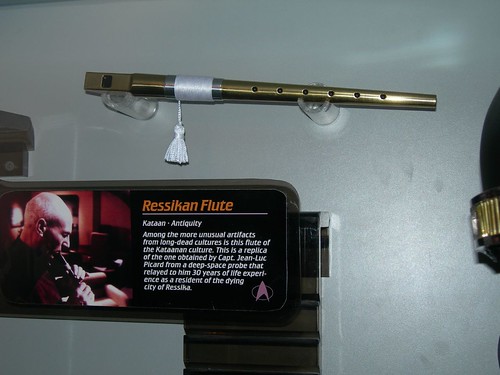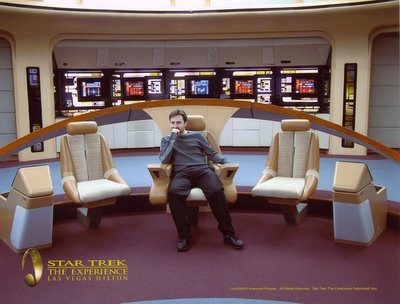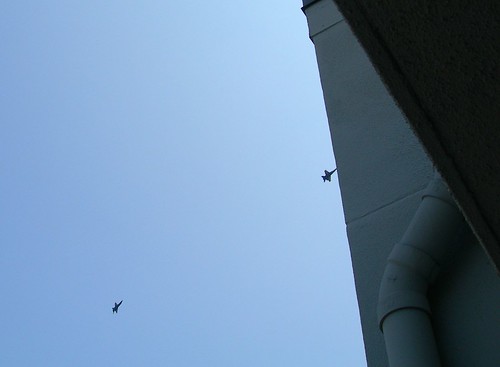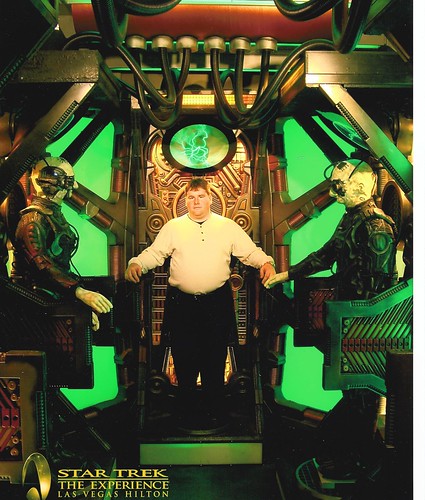Impostor Speaker Dupes La. Officials
NEW ORLEANS Aug 28, 2006 (AP)— A man claiming to be a high-ranking federal housing official addressed a conference Monday on public housing in the wake of Hurricane Katrina, claiming the government was reversing its policy.
...
The Yes Men: http://www.theyesmen.org
2006-08-31
The best thing about this article...
2006-08-30
2006-08-29
Nah, there's no anti-Bush bias at the Daily News
Big storm's not over for Bush
BY KENNETH R. BAZINET
DAILY NEWS STAFF WRITER
President Bush visits with Biloxi residents after delivering speech.
WASHINGTON - A year after Hurricane Katrina, President Bush is still grappling with his administration's feeble response to the storm that devastated the Gulf Coast and ultimately crippled his presidency.
I think it's a little early to describe it as "crippled."
Bush and his cronies [emphasis added] have suggested that Mississippi and its GOP governor have done a good job doling out relief aid while the Democratic leaders in Louisiana play catchup.
However, politics aside, people blame Bush for the failures after Katrina. A new CNN poll shows Bush's response to Katrina rates lower now than it did in the month following the storm - 64% of Americans disapprove of Bush's handling of Katrina, a nearly 10-point jump from a poll taken last September.
Once you describe members of the administration and presidential aides as "cronies" I don't think you can really put "politics aside" in a news article. Maybe in an editorial, but not in a standard piece of reporting.
2006-08-28
Looking for a Sandwich?
I got to know the Staggering Ox at its original Helena, MT location in the Lundy Center. It's still there, and presumably doing good business. It was a quasi-alternative health food sandwich shop before such places were cool.
You place you order at the counter. They give you a playing card, and you sit down amongst the plants until they bring you your order.
The plant collection was impressive when I was there form 1989 to 1995. Apparently it was even more impressive before the blast in 1988 (a train explosion in February that blew out all the windows -- the frigid temperatures killed the existing plants).
The Staggering Ox was a favorite lunch place when we were feeling wealthy -- and willing to spend $5 or so.
The sandwiches are amazing. My favorite was always "The Nuke". It includes Ham, Turkey, Roast Beef, Swiss, Provolone, Sharp Cheddar, Lettuce and Sauce. I always ordered it white, with Italian dressing, and tomatoes. It was always a great sandwich.
I hadn't realized how much I missed it until today when I heard the add. It's been at least 6 or 7 years since I've been there. So tonight I eagerly headed out to:

So the Missoula location is basically a generic stip mall store front. Maybe they'll personalize it more in the coming years.
But it is in a nice neighborhood.

The Staggering Ox is the kind of place that can't be bothered with those modern "drinking glasses".

You will drink your soda from a Ball canning jar, and you will like it.
And they were doing it before it was trendy.
But I know what you really came here for. You want to see the sandwich.

Isn't she a beauty? The Clubfoot sandwiches are basically a food long round, wide, hollow bun. It's closed at one end and stuffed with tasty sandwich fixin's.
The trick to eating one is that you have to start at the top. Pick it up so you are looking at the stuff in the sandwich. Now rotate the sandwich so the seams are on top and on bottom. When you squeeze the sandwich, squeeze by those seams. This is very important. If you rotate it 90 degrees so the seams are parallel with the table, and then squeeze, you might split the sandwich and end up with meat and lettuce all over the the place.

It was as good as I remember.
2006-08-27
The Inner Light
“The Inner Light” is the best episode of Star Trek: The Next Generation. Since Trekkies are so easy going, I’m sure they’ll agree with little controversy.
Gene Roddenberry may not have intended for Patrick Stewart to run away with the show, but the he did. The five best episodes of Star Trek: The Next Generation are The Inner Light, Tapestry (Previously quoted here), Chain of Command (Part II),
Best of Both Worlds, and All Good Things (Parts I and II). Each episode is a deep exploration of Picard’s character. He must question who he really is and what he really knows. Three of those episodes put Picard in to another life altogether.
While many of us may wonder what it’s like to live a completely different life, Picard actually finds out. He is afforded the opportunity to jump out of normal day-to-day living and take on another life.
In Inner Light, however, the writers evoke another common fantasy theme. Not only does Picard live another life, he does it because he is special. While the circumstances are different, and Picard wasn’t exactly living under the stairs with spiders, this is the same theme that brings Harry Potter into the wizarding world, Anakin, and later, Luke Skywalker into the world of the Jedi, Buffy Summers into the world of the supernatural, Hal Jordan into the Green Lantern Corps, pulls Neo from the Matrix, and takes Frodo out of the Shire. They have all been pulled from their normal lives to fight a significant evil. They are destined to it. They have a higher purpose.
Not all heroes go through this. Superman, Spider-Man, Batman, and Commander Adama don’t. They make tough and heroic decisions, but they are responding to circumstance, rather than destiny. They are not chosen by some outside force to save the world.
In “Inner Light”, the Enterprise encounters a strange satellite. As the approach it, it probes the ship and crew members, and latches on to Picard. It chooses Picard for a special task. It connects to him with an energy beam.
With Picard unconscious and experiencing unheard of levels of mental activity, the crew figures out the satellite came from a start system destroyed hundreds of years ago by a sun that went super nova.
Meanwhile, Picard wakes up with someone else’s name in a house he does not recognize, with a woman claiming to be his wife. She tells him he is an iron worker who has been sick. Picard resists, but as the years go by, he begins to accept the new world as his own, and he begins to believe the Enterprise and planet hopping was all a dream.
He becomes a valued member of the community. He develops friendships, watches his wife and friends grow old and die, has a family, watches them grow, and ages him self. He raises his daughter to be a scientist. His son becomes a musician. He becomes a grand father and plays with his grand kids.
Throughout this life he explores his science hobby, and predicts the impending death of his world. He alerts officials but they inform him they already know, and there is little they can do. They have some mysterious plan to protect the culture,
And he learns to play the flute.

One day, when Picard is an old man, decades after he arrived, his family brings him out watch the launch of a satellite. He is shocked to run into people he loves from years past. His best friend. His wife. They explain everything to him.
The satellite is a library of the culture launched years ago to preserve the best of the society. When the satellite found Picard it connected to him and allowed him to live in the society for more than 35 years. He is the sole repository for the lost civilization. As long as Picard remembers, the world will live forever.
We see the contrail from the satellite launch, and Picard wakes up on the Enterprise. To the crew, he has been unconscious for about a half hour. But in that time, Picard has built decades of memories and has to slowly reacclimate himself to the modern world and ship he leads.
The crew brings the satellite aboard and analyzes it. It was a one shot deal though. It chose Picard to be the culture then died. The only thing init is an old wooden box. Riker bring the box to Picard. Thos only thing in it is the flute he learned to play in that other life. Riker leaves him alone, and Picard begins to play.
The tone and pace were perfect. The story and script were tight. They didn’t show us everything; they trusted us to fill in the gaps. It’s the best episode of the series, and it’s not even part of some larger story arc.
Beyond making Picard deal with the intense questions of “What is live?” and “What is a dream?” it exposed let him live a new life. It gave Picard the family he could never have as a Star Fleet captain. It pulled him from the intense modern life style and gave him a life in a slower time. He lived in a country at a different pace. And in doing so managed to save the memory of another people.
“Inner Light” drew on great fantasy traditions with an original concept. And it was executed flawlessly. That makes it the best episode from the entire series.
Got a spare police car to sell? Or maybe a used bicycle?
N.D. town short squad cars after chase
GRAND FORKS, N.D. -- The city is short on squad cars after a man led police on a destructive chase and crashed his van into 10 cruisers, officials said.
Jake and Elwood not availabe for comment.
2006-08-26
Quite a Year

One year ago, Jon Clarke launched Not In My Book -- "A place where Jon Clarke, writer, guitarist, comedian and malcontent, rails against all those things you barely care about. "
He's managed to write pretty much every day and is always a good read. If you haven't read it lately, this is a great opportunity to do so. Leave him lots of comments.
Congratulations, Jon. Happy Blogiversary.
2006-08-25
Book Review 05: Cue the Chase Music
Nickie said, ‘I doubt it. People are pretty forgiving when it comes to family. The only family that ever horrifies you is your own…’
All Families are Psychotic
Douglas Coupland

I’ve been a Douglas Coupland fan since Generation X came out 15 years ago. The Vancouver, BC, native has an entertaining and addicting writing style. He uses seemingly contradictory images to evoke clarity, and rarely fails to amuse.
In “All Families are Psychotic” Coupland continues to explore his losers are winners and winners are losers themes. Like in most of his books, the pristine middle- and upper-class families are shown to be a complete mess. Those with strong egos are similarly vilified. Generally, the cleaner the house, nicer the car, and more “proper” one of Coupland’s characters is, the more likely they are to be shown as depraved or destroyed in the end.
Coupland’s heroes tend to be the Noble Loser who lives on the fringes of mainstream Canadian or American society. They may be somewhat shady. They have done bad things in the past. But they mean well. They are struggling to survive, and, in their own way, do the right thing.
Coupland often throws in a supernatural character, or a dead character, or a character that should be dead. Or in some cases and alternate reality altogether. There’s less of that in this book, however.
This book is the weakest Coupland book I read. There is still the wonderful use of language. There is still a nice focus on character. The plot, however, is terrible. Rather than focus on the story of the families in this book, Coupland throws in a zany caper that has the family member zipping all over the state of Florida while they coincidentally keep running into one another.
If you like Coupland, or would like to explore the works of the eponymous Generation X author, skip this book for now. Focus instead on Generation X, Girlfriend in a Coma, Miss Wyoming, and “Hey Nostradamus”. They will be more rewarding.
Before I get into the story, I want to mention the punctuation. In Generation X, Coupland and his publisher took a unique approach to the layout of the book. All Families uses a traditional layout, but some alternative punctuation. Coupland ditched quote marks (“) in favor of apostrophes (‘) whenever he quotes a character. When the character is quoting someone else, Coupland uses italics instead of apostrophes. I don’t know if this bothers me. It doesn’t really add to the experience, but isn’t a major distraction either.
The plot focuses on the Drummond family. Ted and Janet have three grown children and are divorced. Sarah was born with only one hand because her mother took Thalidomide while pregnant, before it was banned. Wade is the second child. He is the independent, rebellious child who left home young and lived a rather shady life. The story opens with Wade in jail after a bar fight. Brian, the youngest is the weakest child of the family. After three failed suicide attempts, he feels a perpetual black cloud over his head. The family, along with their varied spouses and significant others, are in Florida for the launch of the space shuttle, where Sarah is a crew member. We quickly learn that several of them are HIV positive and suffering from a variety of symptoms while maintaining a complex pill ritual.
After introducing the family in cheap hotels, jail, and generally a disheveled manner, Coupland contrasts them with the Brunswick family – the family of one of Sarah’s shuttle crewmates.
They drove 15 minutes and arrived at the subdivision home of the Brunswick family – an astronaut clan as different from the Drummond family as heaven is from earth. Children in NASA T-Shirts were on the front lawn, looking at the moon, visible in daytime, through a telescope. The front door had a window shaped like a crescent moon. Behind the door stood Alanna Brunswick, wife of Mission Commander Gordon Brunswick, in a Star Trek T-shirt and holding a platter of Tollhouse cookies, smiling like a perfume counter saleswoman. The doorbell was still playing the Close Encounters theme song as she spoke, with a trace of tightly concealed surprise in her voice: ‘Howie, this must be your…brother-in-law, Wade.’
Page 14
The perfect suburban life style and family are completely alien to the Drummonds. While Sarah was a great student, education was not really a priority for the Drummonds.
Bryan said, ‘I don’t think I’ve ever been in a library.’ His voice was empty of any ironic trace.
‘I have,’ Wade said. ‘In Las Vegas, when I became sick. They’re so weird, aren’t they? I mean , all these…books.’
Page 174
But, as we soon learn, all is not as it appears with the Brunswicks.
Elsewhere, when Janet sees her ex-husband for the first time in several years, she notices how the world has beaten him down. It’s burned out the spark he once had. And, while there was always something a little sleazy about him, It’s now even more obvious.
Ted’s signature eye twinkle had mutated since she’d seen him last, having now become the bland politician’s smile – the smile of someone who knows that the bodies in the car trunk are indeed dead.
Page 43
One of Coupland’s trade marks is the juxtaposition of deep thought and absurd activities. He does that in most books, and this one is no different. Through out the story he plays the Drummond men for laughs.
Janet was looking out that van’s window at Wade, tackling Brian on the terra cotta brick driveway of a Floridian muffler king. Janet thought a bit more about the muffler king and what she’d read about him on the Internet back at the library: Well, he isn’t really a muffler king, per se. He’s really more of an in-dash cigarette lighter king, or an injection-molded-vinyl-insert-that-fits-into-the-window-rolling-up-knobby-available-in-any-color king – or the king of standardized automotive snippets that can be made in one of those itty-bitty equatorial countries with no human rights or distinct regional cuisine. Mufflers? But to manufacture nothing but mufflers – an undiversified product line? How archaic. How sentimental. A formula for failure.
Ted, meanwhile, seemed to be kicking both his offspring with equal vim.
Page 195
Characters in Coupland’s books often sit down with one another to talk about their self revelations or their views of the world over coffee, drinks, dinners, etc. It’s not unlike what we did in college, and seems to be one of his favorite expository techniques.
When asked about her reaction to finding out she was HIV positive, Janet tells Nickie, Ted’s new wife:
Janet sighed. ‘Let me think. Nobody’s ever asked me that.’ How have I changed? You know what? The biggest change is that I stopped believing in the future – which is to say, I stopped thinking of the future as being a place, like Paris or Australia – a place you can go to. I started believing that we’re all going, going, going all the time, but there’s no city or place at the end. We’re just going. That’s all.’
Page 120
Coupland takes us into his characters thoughts of the world around them. On the state of Florida, Wade thinks:
Wade took his pill, sipped his juice and went to look out the window at the hotels and roads and cars covering Florida. Talk about a time machine.
Of all the states – even Nevada – yet again Florida struck Wade as being the one most firmly locked in the primordial past. The plants seemed cruder here, the animals more cruel and the air more dank and bacterial. He felt as if the whole landscape were resigned to the fact that in a billion more years it’d all probably be squished into petroleum.Page 71
Based on what I’ve seen of Florida, he’s probably right.
On the utopia that is Disney:
Wade was feeling dizzy. The glare and the crowds were swamping him. I’m in Walt Disney World. I never thought I’d be here, yet here I am. No newspapers. No litter. No evidence of the world outsides its borders – like a casino, really. Endless distractions. It could be 2001, it could be 1986, and it could be 2008. And all these young parents – so much younger than me – no old people save for Dad. A few bored and embarrassed teenagers. This is supposed to be life-affirming? This place is a like come cosmic dream crusher. All you can get out of a place like this is a creepy little tingle that lets you know your kid is never going to be anything more than a customer – that the whole world is being turned into a casino.
Page 93
On the compromises people have to make in their lives:
Four iced teas were plunked onto the table. From his attaché case Norm removed a flask of peppermint schnapps. ‘The favored beverage of teenagers around the world. It rots my gut, but leaves my breathe minty fresh. Life is such a collection of little trade-offs.’
Page 95
On the medical research community:
‘You see, fixing cancer is one thing, but fixing society is another. Curing a huge disease like cancer would effectively wipe out the insurance industry and consequently the banking system. For each year we increase the average life span, we generate a massive financial crisis. That’s what the twentieth century was about – absorbing, year by year our increased life spans.’
Page 210
On world economies and totalitarianism:
‘My father always said that the fastest way to cripple any economy is to manipulate the key labor unions into striking. This invariably makes the middle class flip out, and, before you know it, boom, there’s a tyrant running the show. Anything to keep the lettuce arriving in the supermarkets on time. Cheers.’
Page 230
As you can see, Coupland has some wonderful and original imagery. He paints a vivid picture of the people in his stories. He details select characters in such a way that it is easy to see them grow through the story. We even get insight into secondary characters, though he doesn’t always flesh them out.
Coupland is at his best sketching characters. His stories often create a large sandbox that he drops characters into to see what they will do. Sometimes they are completely impossible sand boxes, but they are really character platforms so it’s okay.
“All Families are Psychotic” for all its absurdity, is a straight forward story. It has a beginning, middle, and an end. Characters come and go and evolve.
But as ridiculous as this sounds, the plot gets in the way of the story. Coupland throws in a contrived wacky, zany, criminal adventure that just seems forced. Wade even brings in his family members to the caper, apparently to bond with them. They certainly don’t need to be there. And once things get going, their continued bickering causes one silly mistake after another. And just when things seem lost, by coincidence, another family member shows up for no apparent reason and bails them out.
That may be the message of the book, but it gets buried in the sheer silliness of it. The more of a mess the plot became, the more the book annoyed me.
And that’s the problem with the book. Some wonderful writing, beautiful language use, clever juxtaposition and vivid imagery gets broken up with, and squandered by, a plot more reminiscent of a bad Abbot and Costello movie that of a good novel.
2006-08-24
2006-08-22
Book Review 04: An Obsession in Soil
The $64 Tomato: How One Man Nearly Lost His Sanity, Spent a Fortune, and Endured an Existential Crisis in the Quest for the Perfect Garden.
“…Every Brandywine tomato we picked this year literally cost us sixty-four dollars to grow.”
Now I had her attention. She put the journal down and stared at me for what seemed an eternity.
“And just how do you know that?” she finally inquired hesitantly, not sure she really wanted to know.
I laid the spreadsheet in front of her. She studied it for a minute.
“We spent all this on the garden?”
“Maybe more. I’m sure I forgot some things.”
Page 254

William Alexander’s book “The $64 Tomato” is the story of one man’s battle against nature to, coral it and turn the Old Brown house into his wife’s dream home and his ideal garden.
And he gets his garden. Perhaps not the perfect one. Perhaps not exactly the one he said he wanted. But he developed a wonderful, lush garden that eventually turned into a miniature farm. At the end of the book he seems to come to an understanding about his acreage.
Sitting in the garden, staring out at these rows, I realized that, in the way we get the leaders we deserve, in the way that dogs often resemble their owners, I guess in the end we get the gardens we deserve. The French existentialist Jean-Paul Sartre said it another way: each of us gets the war we deserve. I wanted a garden that was sloppy, rambling, surprising, spontaneous. But I had to face it: as much as I hate to admit it, I am khaki, deliberate, and straight forward. Maybe that’s what Bridget saw in me, and that’s the garden she designed for me.
Page 243
The non-fiction book is a collection of short stories. Each chapter stands on its own and tells several tales. Alexander jumps around in time and tells stories of his upbringing, his family, and his current life, all framed in the context of the garden. His story telling style is engaging, if a bit forced at times.
His chapters often follow the structure of Garrison Keillor’s “News from Lake Wobegon”.
- Here’s where we are today.
- Here’s how we got hear.
- That’s like what happening ion the past.
- Here is that story.
- Now we’re back to today.
And the story wraps up nicely.
He takes a self deprecating approach to his stories. He accepts responsibility for all the mistakes he makes. In his garden, he set lofty goals and gradually adjusted them to fit the real world. For example, in the beginning he wants to be pesticide-free and organic, but gradually adds more natural and, ultimately, chemical tools to his arsenal. In the process, he has a moment of self discovery as he finally began to understand the perfect gardens and crops his father used to grow.
He digs deeply into his failures for entertainment value.
Through the summer, my little apple swelled and showed hints of red inside its protective sheath as my family waited in anticipation of the crisp fall day when, dressed in our L. L. Bean red-checked flannels, we would descend into the orchard and with great ceremony pluck the literal (and only) fruit of our labors.
But before that day could arrive, on a sweltering mid-August afternoon, I bumped the tree slightly with the lawn mower, and the young apple, bag and all, plopped unceremoniously to the ground in a muffled thud. From Gregor Mendel to Homer Simpson. I sheepishly brought it inside to face the silent stares of my inquisitors. “Must be ripe. Popped right off,” I said cheerfully. We sliced it into quarters and ate it on the spot. It was the best apple I have ever tasted, if a bit tart. And hard.
Page 87
He also has a nice appreciation for dark humor. He takes particular joy in telling stories of his electric fence.
An electric fence is usually used to keep livestock in, but it can also be effective at keeping wildlife out. The high-quality models originate from either New Zealand (developed for the huge sheep-farming industry) or Germany (don’t ask).
Page 99
Reasonable people may wonder why I had a 6,000 volt electric fence around my orchard.
Page 102
Don’t worry. Alexander’s electric fence was part of his ongoing war of attrition with deer, ground hogs, rabbits, squirrels and other assorted interlopers who seemed to feel the outdoors and everything in it belonged to them.
There are times, however, that the tone gets in the way of the story. I’ve struggled to describe this over the past couple of weeks, and I still don’t have quite the right words. But for lack of a better term, there is an adolescent cockiness to much of his writing. Often it’s enjoyable, but it comes across as condescending at times.
Alexander enjoys being the expert. He exalts in sharing his new found wisdom and knowledge with the reader.
In any event, Johnny A. [Appleseed] made enough money buying land and selling Appleseed – that’s right, selling, not giving away, seeds – to become a moderately wealthy man (not that this eccentric every spent any of it).
Page 82
At times the writing comes across not as friendly chatter, but as a smug lecture. Of course I’m often accused of the same thing from time to time, so I suppose that’s why it bothers me to see it, and why I still relate to Alexander.
He also forces sexuality into the discussion. Of course I can see the connection. Ancient farming rituals and fertility rituals were often tied together. Talking about the birth and growth of a garden naturally ties into matters of birth and sexuality. Alexander, however, calls it out in a way that comes across as, “Look at me! I’m writing about sex and gardening at once.” It’s in the way he approaches it. For example, the chapter titles include “Whore in the Bedroom, Horticulturist in the Garden” and “Statuary Rape”. It’s a little over the top and a bit forced.
The book comes across sometimes as an attempt the change the world. There’s an arrogance in that, but that arrogance is tempered with innocence. He’s often looking for validation from his wife, and, ultimately, the reader.
Overall, though, I enjoyed reading his tales of adventure. His style is very back-page-of-a-newspaper-magazine column. Sort of like Dave Barry if Dave Barry wasn’t Dave Barry.
But one reason I enjoyed the book was I understood part of what drives him. The idea that it can’t be hard, and it must save money, and the result will be so much better is what drove me to start my own indoor herb garden. And I have had thoughts similar to:
At some point, without evening realizing it, I had crossed a line. I remembered a stupendous dinner we had one Autumn evening: pork roast with apples, acorn squash, baby lettuce, Peruvian potatoes. Anne pointed out with pride that everything except the pork came from our garden, and I stopped in midbite, intrigued. Pig farming. Could we, I wondered out loud, raise a couple of pigs? Just think, fresh, organic pork. Forks froze in midair. Mouths stopped chewing. Silence smothered the table as three terrified faces stared at me, then at one another, not sure if I was kidding. I wasn’t sure if I was kidding.
Page 164
But he doesn’t let his garden go that far. He pulls back to reality. But gardening is about possibilities. It’s about creating food and plants several feet high from almost microscopic seeds. It’s about the possibilities of creation.
Gardening is, by its very nature, and expression of the triumph of optimism over experience.
Page 258
Perhaps that’s why I enjoyed his book and why I enjoy my own garden. It’s an inherently positive activity. If not an easy one. As Alexander concludes one autumn:
I will miss the fresh tomatoes, the crickety sounds of summer, the lobster rolls eaten on the porch. But I am also relived that summer is over. Gardening is often thought to be a genteel, relaxing hobby, an activity for the women of the garden club as they dally about in their straw hats, fitting lotioned hands into goatskin gloves, sipping tea under the shade of a magnolia. I am not a member of that club. For me, gardening more often resembles blood sport, a never-ending battle with the weather, insects, deer, groundhogs, weeds, edgy gardeners, incompetent contractors, and the limitations of my own middle-aged body. And it turns out to be a very expensive sport.
Page 257
The book is a worthwhile read. It’s entertaining, and really tells the reader about Alexander and his garden. His stories are funny, informative, and evocative. It’s a fairly quick read. While I find it difficult to stop after each chapter, it’s not because of annoying, continual cliff hangers. It’s because I want to hear the next tale. Since the book is highly modular, however, it is a great choice for anyone who has just 30-45 minute chunks of reading time.
To follow his post-book gardening tales, or to learn more about the book, visit Alexander’s website at www.64dollartomato.com
And with that, I’ll leave you with one final thought from the book:
The great terrifying existentialist question: If you were doomed to live the same life over and over again for eternity, would you choose the life you are living now? ...That is, if the answer is no, then why are you living the life you are living now?
Page 245
2006-08-21
You hate to see that

Vandals damage 36 headstones in historic Helena cemetery
By ALANA LISTOE IR Staff Writer
Vandals damaged more than 36 headstones in the historic Benton Avenue Cemetery some time over the weekend. The cemetery board has no money to make the repairs. A small reward is being offered for information leading to the arrest of the culprits
This is an amazing grave yard right near the campus. I walked through there several times at school. The old grave markers have sucha variety of colors and textures as they mark the lives of Helenans long gone. I spent time photographing those stones for class and got some great results.
There's something peaceful about visiting an old grave yard. Looking at the stones and thinking about the lives of people who lived and died forty, sixty, or even a hundred years ago. There are wll known people in these graveyards, but also plenty of unknowns or civilians. People who had family at one point, and friends who buried them under that stone marker. That piece of granite is, for most people, their only stab at immortality. It can remain for hundreds of years in a way that street names and family legacy cannot.
They are places for deep thought about big issues like life and death, and about the smaller trivia that fills all our lives. Depending on your perspective, you are alone, or just among silent companions.
Of course, I'm not sure I'd recomend a walk late at night...
Shatner-Palooza: Common People
In the meantime, don't forget that, well, Shatner rocks.
Don't believe me? I've mentioned Has Been before. Here he is with the lead off song from the album. It's William Shatner, Ben Folds, and Joe Jackson on the Tonight Show singing Common People.
This is the Shatner of today.
2006-08-19
Tempting Fate?
Live life
Live life like you're gonna die
Becasue you're gonna
I hate to be the bearer of bad news
But you're gonna die
Maybe not today or even next year
But before you know it you'll be saying
"Is this all there was?
What was all the fuss?
Why did I bother?"
2006-08-17
Why Vista is Late
Ballmer Analyzes Microsoft's 'One Big' Vista Mistake
By Stacy Cowley, CRN7:39 PM EDT Mon. Jul. 31, 2006
Microsoft made one big, wrong decision that led to Vista's delays, Microsoft CEO Steve Ballmer told financial analysts during his meeting with them last week. The company took a Big Bang approach and tried to overhaul all of its operating system's core components simultaneously, an approach that eventually led to a fiery development crash.
"We made an upfront decision that was, I'll say, incredibly strategic and brilliant and wise -- and was not implementable," Ballmer said. "We tried to incubate too many new innovations and integrate them simultaneously, as opposed to letting them bake and then integrating them, which is essentially where we wound up."
What I find interesting is that MS has made major overhauls in the past. In the mid-90s, Gates decided MS needed to be an internet company. He basically stopped the compnay and changed directions. In a few short years, IE was the dominant browser and Outlook the dominant corporate email client. Frontpage became on of the leading coding apps, and MS Instant Messenger quickly surpassed ICQ and now dominates over Yahoo! IM and AIM.
But an OS is different. It's much more complex; and everything has to be right. And Balmer isn't Gates. With the Internet shift, Gates was all about the vision of how this was going to change the world. I don't see a similar vision with the OS.
2006-08-16
Not Shatner-Palooza -- Takei-riffic
He now has a blog on MySpace.
My favorite part is this headline:
GEORGE TAKEI ISSUES STATEMENT ON DAILY VARIETY STORY
by George Takei
George Takei is involved in many projects.
He even hosts an upcoming radio series on Public Radio highlighting Asian-American history, called Crossing East. His cohost: Margaret Cho. I'm not making fun of this nor am I making this up; I just can't quite get my head around the idea of George Takei and Margaret Cho doing radio work together for Public Radio. For some reason, my brain keeps rejecting it saying, "No, you must be mistaken."
And keep an eye open for the William Shatner Roast. Here is a preview clip of George Takei's thoughts. He compares Shatner to a cake he wants to dive into and starts making out with guys on the stage.
I'm glad I sold my Sony stock...
First Blu-ray disc drive won’t play Blu-ray movies
The first Blu-ray (BD) disc drive for desktop PCs is here, but be warned -- it won't play commercial BD movies.
Sony officially announced its BWU-100A product at its "Experience More 2006" event in Sydney yesterday, all the while acknowledging that there's significant room for improvement before the product is viable for integration into media centre PCs.
Vincent Bautista, Sony's product manager for data storage, told CNET.com.au that due to copy protection issues and lagging software development, the drive will only play user-recorded high-definition content from a digital camcorder, and not commercial movies released under the BD format.
2006-08-14
"I'm sorry, I can't hear you over the sound of how awesome I am"

This is another link I originally saw on Fark. Bob the Robot put these together. Check them out and save your favorites before the Paramount lawyers shut him down. There's about 40 of them. Well done, Bob.

The Opposite of Slow Motion
Sometimes, though, you have speed up an event to really see what's happening. These two videos I originally found on www.fazed.net demonstrate that.
For the Gestation Project, Matt Pressnall took a picture of his wife Carlin every other day of her pregnancy. The result is a 30 second video that shows how her body changed over 9 month. It is currently number 39 on Google Video, and it is safe for work.
For this next video, you will have to follow the link to atom films.
Artist Ahree Lee took a picture of her own face everyday from November 2001 until sometime in 2004. She compiled those photos into a 2:34 video so you can wathc her change/age over time. She continues to take daily pictures.
Me -- Ahree Lee
2006-08-12
I apparently look like me
I ordered my Triple Tall 2% Valencia Latte. The barrista said, "Oh, you're going to make this complicated for me?" and smiled. I smiled back and said, "Well, of course. I'm from Seattle." She rang me up and I handed here my Costco Amex. She looked at me and said, "You're one of those airport orderers." I admitted I was. "I practically live in airports." She said, "I can always tell."
So the barrista made me for a road warrior in 20 seconds. What was it? Is my frequent flyer number tatooed on my forehead? Do I smell like cramped seats? Was it the way I gave the in store safety lecture?
Or was it because at 10:00 PM in a major tourist destination overrun with teenagers, little kids, and couples trying not to fight, I was by myself? Could it be that everyone was wearing shorts, jeans, summer outfits, and general skimpy CA clothing while I was wearing a collared shirt and black pants that screamed business casual?
Or could it be that...nah, forget it. There's no way this discussion could end well.
2006-08-11
Who doesn't love a parade?
During my first summer here, I met a woman on AOL and we decided to meet in person to chat. She did not know Seattle very well; she lived in Tacoma. I lived in Mountlake Terrace, a northern suburb at the time [shudder]. The only place I knew of in downtown Seattle was the Tully's on 4th and Union. It's the huge Tully's flagship store. I knew she had long red hair and she knew I'd be wearing an "Aussie hat" which she wasn't thrilled with ("I want to meet the guy, not the accessories"). I figured we'd find each other easily.
When I got there, I had to navigate crowds and ridiculous traffic down town. There were probably 100 or so people in the coffee shop. The crowds were ridiculous. It was Torchlight Parade night in 1998.
I hadn't heard of the parade prior to that evening, and was only vaguely aware of Seafair.
Eventually I met up with my friend. We got coffee and headed down to the waterfront to chat. I thought this was great. We were there in plenty of time for the parade. She explained, however, that she hated parades. Crowds and parades. And not just because of the crowds. I couldn't understand it.
After a couple of hours of chatting I walked her to her car, and then I went to watch the rest of the parade. Not a bad evening.
We met up a couple more times after that. Then I think she got engaged and moved to Scotland. Or Whales. Or something like that.
I guess they don't have parades there.
2006-08-10
The Torchlight Parade
I love a parade. Yesterday, I talked about the Seafair Torchlight Run on 2006-07-29. The Parade follows the run.
Seafair has a nice pirate theme about it. The Seafair Pirates have been part of the celebration for decades. So they opened this parade, too.
And nothing says viscous, nasty, blood thirsty and vile pirates, quite like a flag made of balloons.

The parade features the normal Seattle parade regulars – The Red Hot Mommas pushing shopping carts, the various well uniformed high school marching bands, the slovenly clad college marching bands, the police precision motorcycle team, and the various drill teams.
There are generally two types of drill teams. Those that do something and those that don’t.
Ok, so they all actually do something. But some of them just sort of march down the street in matching uniforms and clap, stamp the ground, and swing their elbows in synch. And the crowd goes wild. Except with these groups, the crowd is setting the bar a bit low. These drill teams seem to come from underprivileged parts of the area. It seems people are often applauding them for just showing up and having kind of a routine down. The performances themselves do not strike me as all that impressive.
The other main group of drill teams usually has a prop of some sort. It may be a large flag or a fake rifle. Now these displays are visually impressive. They are sharp with complex routines. They put on a much better show but don’t get nearly the applause.
The various Asian communities in Seattle also host their own floats. There’s a huge Chinese dragon that’s controlled by about 15 people. They run and dance and top speed. Each block they swap dragon controllers with a bunch of folks they have following them. They run the whole route swapping dragon polls.
Seattle’s Filipino and Korean communities also put on amazing performances of dance, fighting demonstrations, and traditional costumes.
This year, Falun Dafa had a float. Falun Dafa is apparently an organization that practices Falun Gong. It’s either a system of exercise, or, if you believe the Chinese government, a cult that is destroying the world and needs to be wiped out.
Regardless, they have an impressive float. They drill with beautiful paper flowers. They have a group of people marching. They have a float with people doing the exercises. It all seems so peaceful and tightly disciplined. They are amazingly focused. The entire display is, well, kind of creepy. That’s no reason to ban a movement, but a chill did run up my spine.
One of my favorite groups, though, is Seattle’s LRFD, or Last Resort Fire Department. They bring out all the ancient firefighting vehicles from the twenties and thirties. The red has faded to brown, and the engines struggle to make it up the street. Overall design of vehicles hasn’t really changed that much.
While I know the name is a joke, I just like the idea that some day, all the Seattle Fire engines will be out on calls, and the call will go out to the LRFD.
Not a bad way to spend a few hours.
2006-08-09
Run Away! Run Away!
Last weekend was Seattle’s annual Seafair Torchlight Run and Parade (2006-07-29). Seafair celebrates Seattle’s rapidly vanishing nautical heritage. One Saturday evening each summer, the city closes the street and thousands of pasty, pale, or sunburned people of all races crawl out from their hiding places to watch people who aren’t being chased run either 5 KM or 8KM. Or fall down trying.
The run began as normal. The Flash and his partner were the first down the street.

There was the normal mix of serious runners who looked okay, serious runners who looked like they were in pain, and amateur runners who clearly had the “What the hell was I thinking?” look. And pirates. Every Seafair event has pirates. Not the music or software kind, but good old fashioned hook-for-a-hand pirates.
My knees hurt just watching the legs and feet of the runners as they slammed into the pavement again and again. It seemed obvious to me that the human body really wasn’t engineered to pound sneakers repeatedly against concrete.
Several protesters joined the run too because, well, it’s Seattle and that’s what people d0. New Yorkers grab a hot dog from the cart. Seattle-ites grab some PVC and cardboard and demand a free Tibet. Or the protection of the turtles. Or owls. Or Salmon. Or they call for the impeachment of the president. Or they protest whatever the war-of-the-week is.
This time the protests were tame. There weren’t many. The main cause of the week was same sex marriage because the Washington State Supreme Court upheld the state’s ban.
Three pairs of women ran the race together in racing-modified wedding dresses. They ran with official race numbers and everything. What I found interesting was that they were completely independent of each other. These three couples were running in completely separate parts of the race and there was nothing to indicate they were aware of one another.
Unless it was really just one couple running around the block. But that makes about as much sense as, well, running in a race in the first place.
To emphasize their focus on healthy foods, Jamba Juice did not sponsor a float. Instead, they dressed people up like bananas and entered them in the race.

When you run a race down the street, you can close it to vehicular traffic, but it’s tougher to close it to pedestrian traffic. Sure, you can try to corral people with tear gas and riot gear, but the Seattle Police Department hasn’t had much luck with that historically. And for a parade you don’t want to do that.
So instead, you wait for a gap in the runners, and you let the pedestrians through. They have to run across the street before the police stop the rest of them to let more runners through.

It’s like something right out of a loony tunes cartoon.
Children love things like this. It’s a chance for them to beg, whine, and cajole their parents into buying them a rave-like glow stick, low pitched plastic horn, dull sword, or giant inflatable hammer. And then they make noise for the next several hours until they get bored and make different noises.
Most of them will one day have their career peak as the day manager of an Applebee’s. Some, however, will be the future leaders of tomorrow. Like this girl.

Not content to merely observe the race, she decided to participate. She stepped into the street so passing runners could slap her hand. A bunch of them did.
Pretty soon, it seemed a sibling joined her.

Then someone else joined here.

Before long, she had an entire gang joining her.

Soon kids up and down the block were reaching out their hands to greet the runners.
Of course, as a country we celebrate the winners. But we also love our underdogs and last place people. Be great or be awful. Just don’t be mediocre. We hate that.
The runner who got the most applause – even more than the wheel chair guy—was this one.

He was that last runner, and he struggled with each step. Breathing looked like a chore at this point in the race. He was several minutes behind the previous runner. The police car stayed behind him, presumably to pick up the body.
2006-08-08
Shatner-Palooza: Rocket Man
Originally a cheesy Elton John song, William Shatner made it his own at a Sci Fi convention in 1978. Geeks and mockers alike passed this bootleg video around the internet for years. The quality may not be the best, but it is such an amazing performance that no one cares.
Now, when someone covers Rocket Man, they have to choose a normal version or a Shatner version.
The Shatner version is winning.
Jon sent me this link to Chris Elliott's performance on the old Late Night with David Letterman. Chris Elliott played a series of silly characters, including one who lived under the studio stairs. Here he is taking on Shatner.
Family Guy took on Rocket Man, as well. One of the most frequently posted clips from the show features baby Stewie lighting up and singing.
Even fans have made their own version -- Shatner meets Stewie by some guy.
Oh, and if you want to see how the orignal singer does it, here you go.
2006-08-07
"I've got a [beep] feeling it could be [beep] bunnies"
Yes, I am a frequent flyer. That means I travel in uniform. On a plane I'm usually wearing the official, mandatory Frequent Flyer head gear -- a pair of Bose Quiet Comfort 2 Noise Cancelling head phones.
I hooked them up to my Ipod and hit play. Every few seconds, though, I heard a beep. At first I was afraid something had gone wrong with my Ipod or head phones. Both situations would be bad.
Then I looked out the window and saw the rotating airfield radar. The top part spins around to blast the surrounding country side with radio waves. Each time it pointed at me, however, I heard the beep.

I intially though that was kind of cool. I could hear the radar. My equipment wasn't broken. Then it got annoying. They I started to think I shouldn't listen because this radar is busy microwaving everyone in the terminal. I was about to shut down my MP3s when it occurred to me that maybe -- just maybe -- my music wasn't contolling the system, and that even if I stopped listening it would still turn me into an El Monterey Chimichanga.
So I switched to soundtracks and decided to just be annoyed. I'm good at that.
2006-08-06
To Boldly Bam where No One had Bammed Before
 According to a report on KUOW this evening, the astronauts on the International Space Station eat bland food. Actually all the astronauts eat bland food.
According to a report on KUOW this evening, the astronauts on the International Space Station eat bland food. Actually all the astronauts eat bland food.And you can only drink so much Tang. I suppose Tang is less Tang-y in space, too.
The problem is that most standard food is bland in the weightless environment. Basically, without gravity, there is nothing pulling people's blood and other internal fluids to their feet. So their heads swell up. When the head swells with extra fluid, the tounge becomes less sensitive to taste.
So the question of how to make good food taste less bland has plagued science for more than 40 years of manned space flight. Finally, someone came up with a soluiont. "How about we make it spicy?"
Enter Emeril Lagasse, of FoodTV fame.
It will be rocket science for Chef Emeril Lagasse when his recipes are served to the astronauts on the International Space Station on August 10, 2006. Lagasse is the first celebrity chef to have meals developed for NASA astronauts and the first person to have those recipes served in space.
...
Working with the NASA Space Food Lab, Emeril’s Homebase staff and the Emeril Live staff, Emeril chose five recipes that were tested and prepared for delivery to the International Space Station. The crew will enjoy Emeril’s Mardi Gras Jambalaya, Kicked up Mashed Potatoes with Bacon, Green Beans with Garlic, Rice Pudding, and Mixed Fruit.
The KUOW report mentioned that they had to change some of the recipes. For example, one of them used Rum as an ingrediant. Despite what we learend in Armageddon, however, there is no alcohol allowed on the space station. So they switched to Rum extract.
I used to enjoy Emeril's show, but eventually I got tired of watching it every day. It's still fun for special occasions. It takes a lot of energy to watch. But I still appreciate what he's done for the food network.
If you ever want an amazing steak dinner in Las Vegas, be sure to visit Emeril's Delmonico Steak House in the Venetian. You'll need a mortgage to pay the bill, but it is so worth it.
Improved space cuisins is part of an ongoing trend. According to NASA:
Menu options for shuttle and station crews are more extensive than ever before, with about 200 U.S. food items available. Russian food also is available.
How many takers do you suppose they have for the Russian food? Russia may be known for many things, but I've never thought of it as a culinary powerhouse.
2006-08-05
The New 787
If you are something of an airplane buff, check out Boeing's new site.
http://dev.newairplane.com/
The password and ID are both: wdtpreview
The site has tours and details on the new 787 currently in development. The plane is scheduled to enter service in 2008, and I can't wait to ride one.
2006-08-04
A different Perspective
What's interersting, though, is how the two daily, mainstream newspapers in Seattle covered the story.
From the Seattle Post Intelligencer:
Estate tax cut dies for now
'Tip credit' provision pushes Murray, Cantwell to vote no
By CHARLES POPEP-I WASHINGTON CORRESPONDENT
WASHINGTON -- After days of heavy lobbying from all sides, Sens. Patty Murray and Maria Cantwell on Thursday voted against advancing a bill that would cut estate taxes for the wealthy, worried that the complex measure would bloat an already large deficit and cut wages of workers in Washington state who rely on tips for part of their income.
From the Seattle Times:
Minimum-wage boost defeated
By The Associated Press and The Washington Post
WASHINGTON — A Republican election-year effort to combine a cut in inheritance taxes on multimillion-dollar estates with the first minimum-wage increase in nearly a decade was rejected by the Senate late Thursday.
I'm sorry. Can I call you back? I can't hear you. I'm being buzzed by jets.
On Saturday, 2006-08-05, Seattle's annual Seafair celebration climaxes with the HydroPlane Races.

With the HydroPlane Races, comes the airshow. That's right -- the Blue Angels come to Seattle every year.
Forget the tax dollars, the Blue Angels are just cool. The precision flying is amazing. They fly those jets at high speed so close together they could pass jars of Grey Poupon back and forth.
Today was a practice day for them because even the best of the best have to practice. And they practice right over my building every year. I took these shots during the afternoon. The pictures don't come close to capturing the live experience, but still -- enjoy.










2006-08-03
2006-08-02
Elephants Rampaging Across Africa -- The New Wikiality
This broadbast orignially on Monday night, and already nearly 100,000 people have watched it on www.Youtube.com. Watch it before the cease and desist order arrives.
If you aren't familiar with www.wikipedia.com, it is basically an online encyclopedia that anyone can edit. The idea is that the more people reviewing and editing articles, the more accurate the content will ultimately be. This generally works out well, but for hot button, political, vanity, or controversial entries, it can quickly turn into disaster.
I often link to www.wikipedia.com because the entries are usually accuarate enough for my purposes. The site is a great jumping off point for additional research. But nothing on Wikipedia should be taken as gospel.
Most people edit entries to improve accuaracy and for the greater good of the Internet. It is a powerful democratizing force.
And then, things like this happen:
This is one of the funniest Colber bits I have seen in ages. His schtick is often about mocking the concept of relative truth.
Basically, he edited elephants entry to say their numbers have tripled in 6 months. And that Oregon is Idaho's Portugal.
His fans jumped on his suggestions. Wikipedia SysOps have had to lock down most pages relating to elephants, Oregon, Idaho, and plenty of others. The impact of this charge will be felt through Wikipedia for some time, as posters seek out any and all elephant related entries to change.
There an extensive discussion about this on Fark. You will find similar discussions plastered across the internet.
Here is a discussion about the issue on the Elephants page of Wikipedia itself:
http://en.wikipedia.org/wiki/Talk:Elephant
Some related Articles on Wikipedia (most locked to prevent editing due to these adventures):
http://en.wikipedia.org/wiki/Stephen_Colbert
http://en.wikipedia.org/wiki/The_Colbert_Report
http://en.wikipedia.org/wiki/Elephants
http://en.wikipedia.org/wiki/Truthiness
http://en.wikipedia.org/wiki/Wikiality
http://en.wikipedia.org/wiki/Oregon
http://en.wikipedia.org/wiki/Idaho
On each of those pages, there is a tab at the top labeled "History" that will show all the recent edits and reversionsm such as:
http://en.wikipedia.org/w/index.php?title=Idaho&diff=66989570&oldid=66981137
http://en.wikipedia.org/w/index.php?title=Elephant&diff=67197964&oldid=67167360
**Update**
The story has been picked up by CNET
Late-night TV personality Stephen Colbert claims he has no qualms with
wikipedia. "I love Wikipedia," he said during the July 31 episode of his Comedy Central show "The Colbert Report," adding that "any site that's got a longer entry on 'truthiness' than on Lutherans has its priorities straight.
And Ars Tecnica:
Last night, Stephen Colbert aired a segment on Wikipedia in which he discussed "wikiality," the process of creating the reality one wants to believe in. Colbert referred to the process as "bringing democracy to knowledge" and suggested that his viewers head off to the Wikipedia entry for "elephant" in order to update it with the "fact" that Africa's elephant population has swollen in the last few years. Such an entry would be an "inconvenient tusk" for Al Gore and other environmentalists.
And the Gothamist, a New York focused site:
Sure, "citizen encyclopediaism" isn't a real term, but either was "citizen journalism" at some point, and with Wikipedia...anything can be fact, and anyone can author an encyclopedia entry. Sure the facts are sometimes...totally false, but c'mon, even the Encyclopedia Britannica got Stalin’s birth date and the birth name of Bill Clinton wrong.
2006-08-01
"No fair! I wanted to start World War III"
Two Koreas exchange gunfire along border
By Jon Herskovitz
SEOUL (Reuters) - North and South Korean troops exchanged gunfire across their heavily fortified border for the first time in about a year, a military official said on Tuesday.


